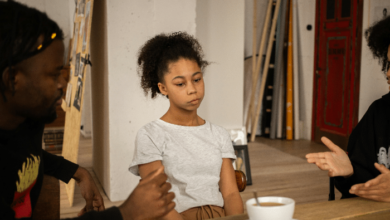Four Tips On How To Talk To Your Kids
It’s an unfortunate reality that we live in trying times. For parents, this means one main worry: how do you create a safe environment for kids. Aren’t they also at the mercy of influences in the classroom, on the playground, and even while gaming online?
You can’t control all those environments, so you need to give your child the best chance of coping when you’re not with them. That means you may have to broach controversial topics neither of you feels comfortable talking about.
The Importance of Communication
You can’t live in denial and think you won’t need to talk about difficult topics. With child trafficking, online bullying, and gun violence being in the news often, the discussions will come up.
You’ll also have to initiate some conversations if you want to teach your child how to handle situations. Most of all, do not get angry if your child has questions about a difficult topic.
You need to identify when your child may need assistance, and the red flags may come up during a talk. There are multiple resources and options to consider. Does he or she need a counselor or a doctor? Or is it a matter of fighting for his or her rights?
That’s when you need lawyers on your side. Simply make sure the professionals you pick are experienced in the niche you need. If you want a personal injury lawyer, look for experienced firms like Tinker law firm.
Help is out there, and it’s your responsibility to make use of it. Now, how do you handle those conversations? According to experts, here are some of the best tips on how to talk to your kids.
Consider Their Age
You’ll use different methods with different aged kids. If your child is still younger than seven, remember to use basic words they will understand, so they don’t feel confused.
They may not understand words such as ‘hate,’ so make scenarios practical. Ask them what HAPPENED or describe the scene without adding abstract emotions or meanings.
For kids around ten years old, you may need to ask about the sensitive part: enquire about what they’re experiencing and share what you’re feeling, so they learn how to communicate their emotions. Help them understand it’s acceptable to be confused or scared.
Make them Feel Safe
You won’t cajole a child into telling you anything personal or private if they feel too vulnerable. So, you need to make them feel safe.
For small children, this means you have to help them understand you’re there to protect them and you can exert power in the situation.
For older children over twelve years, you may have to assure them they won’t face repercussions based on the discussion. With less apprehension about the outcome, honesty will be easier.
Be Honest Always
As stated above, one of the best tips on how to talk to your kids involves you being honest about your own feelings on the matter: whether it’s about a disturbing news report or victimization at school.
It’s essential to show your vulnerability if you want to stay authentic. And don’t lie, because if found out, it will be difficult to rebuild trust for future conversations.
What Now?
If you’re the parent of a teenager, you probably know the challenges of getting them to talk and open up. A practical approach here is to ask them open-ended questions and help them consider consequences. They may not want answers from you all the time, so teach them how to reach wise conclusions on their own.
Last Thoughts
Will it be easy raising children? Probably not in today’s world due to many factors and influences determining your child’s happiness and safety. So, work on communication, the one thing you can rely on is trust in each other. Here are some tips to help you become the best parent you can be.






